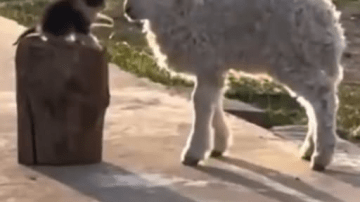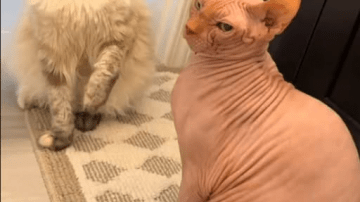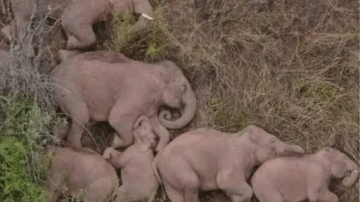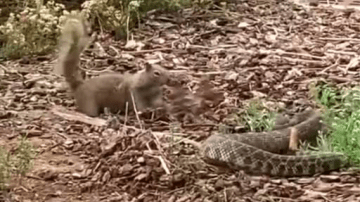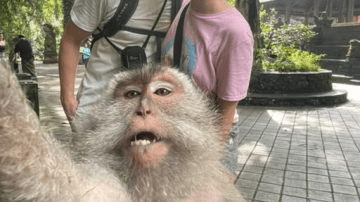It began on a misty morning when the air was thick with the scent of wet grass and distant rain. The swamp, usually calm and silent, was alive that day with faint cries echoing from deep within. To anyone passing by, it might have sounded like the wind—but it wasn’t. It was the sound of life struggling to survive.

And in the middle of that murky water stood a small, trembling puppy—mud splattered, ribs showing, eyes wide with fear yet filled with something powerful: determination.
What could a helpless, hungry puppy possibly do in a place like this? What he did next would leave rescuers speechless, scientists fascinated, and readers like you questioning what true courage really means.
Stay with me, because this story isn’t just about a dog and a fish. It’s about every one of us who has ever been stuck, scared, and still decided to care anyway.
The Cry That Changed Everything
Locals had often seen stray animals wandering near the swamp, but that morning something was different. The puppy wasn’t scavenging for food or looking for a way out. He was barking—desperate, sharp barks—toward something glinting in the shallow water.
When a fisherman approached, what he saw was astonishing: a large swordfish, far from the sea, tangled in roots and mud, struggling to breathe. The puppy, standing chest-deep in filthy water, kept pushing against the fish with his tiny paws, as if urging it back to safety.
Each time the fish slipped, the puppy whimpered, nudged again, and barked louder.
The fisherman stood frozen for a moment, unable to believe what he was witnessing—a starving stray dog risking its life to save another creature. He finally rushed in to help, wading through the muck, heart pounding.
When Instinct Meets Compassion
Many would say animals act on instinct, not empathy. But as this scene unfolded, something deeper was happening. The puppy wasn’t hunting or defending itself—it was helping.
Animal behaviorists later suggested that empathy, long considered a uniquely human trait, might be more widespread in the animal kingdom than we think. One study from Emory University showed that dogs can sense distress in others and often respond with comforting behavior.
Could this puppy, barely old enough to survive on its own, really understand what it was doing? Maybe not in human terms—but it felt the pull to act. And sometimes, that’s all that matters.
The Battle in the Swamp
The swamp was thick and foul, its surface covered in green slime. Mosquitoes buzzed in clouds. The puppy’s paws sank deep into the mud, every step a struggle. Yet it refused to stop.
The swordfish thrashed weakly, its long snout cutting through the water like a blade dulled by exhaustion. The puppy barked again—short, urgent sounds that seemed to say, “Keep going, don’t give up.”
Minutes passed like hours. Finally, with one last push from the fisherman, the fish found a deeper pocket of water. It flicked its tail and disappeared beneath the murky surface, leaving ripples that shimmered like silver under the gray light.
And there, shaking and soaked, stood the puppy—panting, tail wagging faintly, eyes bright with triumph.
The Rescuers Arrive
When word spread through the nearby village, a group of animal rescuers came to investigate. They found the puppy lying near the edge of the swamp, too weak to stand but alive.
They wrapped him in a warm towel, fed him gently, and named him Lucky—because that day, he not only survived but gave life back to another.
The story went viral within days. People couldn’t stop sharing it: “Poor Puppy Saves Swordfish from Swamp!” But beyond the headlines was something more profound—a reminder that compassion can come from the most unexpected places.
The Deeper Meaning Behind the Rescue
Lucky’s story isn’t just about one act of bravery. It’s a mirror reflecting human emotions—fear, love, perseverance, and empathy.
Think about it: how many times have you felt trapped in your own “swamp”? Maybe it wasn’t mud but stress, loss, or exhaustion. Like the swordfish, you gasped for air, unsure if anyone would help.
And maybe—like Lucky—you’ve been the one who stepped in for someone else, even when you were hurting too.
That’s what makes this story unforgettable. It reminds us that kindness doesn’t wait for comfort—it grows from courage.
The Science of Compassion: Why Helping Heals You Too
Psychologists have found that performing small acts of kindness can lower stress levels, boost immunity, and even extend lifespan. Compassion activates the brain’s reward system, releasing “feel-good” hormones like oxytocin and serotonin.
Here’s a simple comparison showing how empathy can change both giver and receiver:
| Action | Effect on the Helper | Effect on the Receiver |
|---|---|---|
| Offering help in distress | Releases oxytocin, reduces anxiety | Builds trust and safety |
| Volunteering or rescuing animals | Enhances mood, combats loneliness | Improves survival and emotional healing |
| Showing daily gratitude | Strengthens mental resilience | Encourages positivity in others |
When Lucky nudged that swordfish, he didn’t just save another life—he rewired his own. His act of courage likely boosted his survival instinct, calming his stress response, and earning him care he’d never have found otherwise.
Case Study 1: Healing Through Helping
Take Martha, 49, who read Lucky’s story online. After years of burnout and grief, she decided to volunteer at a local animal shelter. Within weeks, she noticed her blood pressure drop and her sleep improve.
“It’s like the more I helped them,” she said, “the more I was helping myself.”
It turns out, that’s not unusual. Studies show that empathy-driven action creates measurable changes in brain chemistry, enhancing emotional balance and resilience.
Case Study 2: From Despair to Purpose
Then there’s Daniel, 42, a veteran struggling with PTSD. When he saw Lucky’s photo—muddy, fragile, but determined—he felt something shift. He adopted a rescue dog himself, naming her “Hope.”
Months later, he wrote, “That puppy reminded me that bravery doesn’t mean fearlessness. It means choosing love anyway.”
Lessons from the Swamp
Lucky’s rescue holds lessons that reach far beyond one muddy day.
- Small acts create big change. You don’t need power to make an impact—just compassion.
- Struggle reveals strength. Growth often looks messy before it looks beautiful.
- Empathy connects us all. Whether human or animal, the instinct to care bridges every difference.
- Kindness is contagious. One act inspires another; it ripples through lives unseen.
- Healing begins with giving. Helping someone else may be the first step toward helping yourself.
- Courage comes in many forms. Sometimes it’s loud and bold. Other times, it’s a muddy paw in a dark swamp.
- Hope survives where love leads. No matter how hopeless things look, compassion always finds a way.
But wait, there’s something even more surprising. This story didn’t just end at the swamp.
The New Life of Lucky the Puppy
Months later, Lucky was adopted by a marine biologist named Emily who had read about the rescue. She brought him to her home near the coast, where, every morning, he could watch the waves crash against the shore.
Sometimes, Emily noticed Lucky sitting quietly, staring out to sea. Perhaps he was remembering that swordfish—the creature he once fought to save. Or maybe, just maybe, he was waiting for another life to rescue.
How to Practice “Everyday Rescue” in Your Own Life
You don’t have to dive into a swamp to make a difference. Here are simple ways to bring Lucky’s courage into your daily routine:
| Step | How to Try It | Why It Helps |
|---|---|---|
| Start small | Check on a friend, feed a stray, smile at a stranger | Builds empathy muscle |
| Stay consistent | Practice kindness daily, even when unnoticed | Rewires brain for positivity |
| Care for yourself | Rest, eat well, set boundaries | Prevents compassion fatigue |
| Reflect nightly | Write one act of kindness in a journal | Creates emotional awareness |
These aren’t just moral choices—they’re emotional vitamins for your mental health.
The Circle of Life and Love
When we choose compassion, something magical happens: we stop feeling small. The world may be vast and unpredictable, but kindness makes it feel connected, alive, and worth saving.
Lucky’s story isn’t about a miracle—it’s about remembering that even in the darkest places, light can come from the unlikeliest source.
So the next time life feels heavy, ask yourself: What if I’m the puppy in someone else’s swamp?
Because maybe your small act today will be the ripple that saves another tomorrow.
Final Thought
The poor puppy who rescued a swordfish didn’t just save a life. He awakened a truth we often forget: inside every heart—human or animal—lives the power to heal, to help, and to hope again.
And perhaps, the next rescue the world is waiting for… is yours.
This article is for informational purposes only and does not replace professional medical advice. Readers are encouraged to consult healthcare providers for personalized guidance.

